- Home
- Jessie Haas
The Sixth Sense Page 2
The Sixth Sense Read online
Page 2
“Does Kris want to come?”
I could only nod. I did and I didn’t. She nodded too. She did and didn’t want to have me.
I packed nightgown, toothbrush, and the book I was reading—The Ring of Solomon by Konrad Lorenz—in a shopping bag. I also packed homework, because it would look good, and I might even do some. We drove to Aunt Mil’s dark house.
Mum shone the headlights up the walk as Aunt Mil went ahead to turn on the yard light. As soon as she was out of the car, Mum said, “Thank you for doing this, Kris.”
“Mm.” I was doing it for Aunt Mil, not for Mum. I wasn’t all that willing.
“I worry about her, living all alone. It must be hard to stay rational.”
“Mm.”
“We’ll be at the hockey finals in White River tomorrow morning, but we should be back by one. Call when you want a ride home.”
“I might walk,” I said. The yard light came on, and I got out of the car. “’Night, Mum.”
As I closed the door I remembered for some reason the time when I would never say good night or goodbye to Mum and Dad. It was always, “See you in the morning,” and I thought if I didn’t say it, I might not see them. They might stop breathing in the night, or go away. If I ever forgot, I would have to trek down to the bathroom, blinking and pretending to have been asleep, in order to complete the ritual. They had to hear me too. It was a pact.
I opened the car door again, as I thought it hadn’t closed right, and before slamming it I said, “See you tomorrow.”
When I got inside, Aunt Mil was no longer in the kitchen. She stood in the bedroom doorway with her coat on, looking in. That must be where she laid him, on her bed or on the chair.
I went up to the guest room, carefully stepping on the carpeted middles of the stairs. The door squeaked, so I slid through the opening as soon as it was wide enough and left it open. I put my bag softly on the table and sat on the bed, not jouncing the springs.
It was the guest room, but the books in the case were mine; scroungings from secondhand bookstores, and more expensive ones, gifts from Aunt Mil. The theme—animal behavior; the relation between human and animal, the animal in human, and the human in animal. Serious books and silly books, side by side in rows. My father doesn’t know about them, and he won’t, until someday he’ll see them all gathered in my college room, and he’ll ask if I’ve picked my major.
Aunt Mil’s guest room, then, is really my room, where I may be truly alone, free of questions at the door and tsking from the other side of the wall, where I may do my real studying and not just my homework. But tonight the silence came in the open door, possessing, making the place as strange as a motel room. I sat still and listened.
After a while I heard Aunt Mil’s closet door open and shut. Nothing more. Half an hour went by on the bedside alarm clock. I thought, I’m not here just to sit in my room. So I went down again, treading in the middle of the stairs. To Aunt Mil’s room.
She was bending over the bed in her straight way, folding only at the hips and tucking a very old plaid bathrobe around something small: Puttins. So I had touched his fur for the last time.
She looked up as I came in, meeting my eyes honestly. Her eyes said to mine, I have to do this by myself. You understand. Then she said, “Kris, you could help me. Will you go out to the porch and find a box?”
I could see why she wouldn’t want to do that. On the porch were boxes that presents and groceries had come in, waiting to take presents out or to transport dug-up plants or books. They said WHISKEY on the sides, or VERMONT CHEESE, or TOMATOES. Which would be a suitable coffin for a good old cat?
The cheese box seemed the right size. It said VERMONT CHEESE on all four sides and the top. I thought of covering it with brown paper so Aunt Mil wouldn’t have to see, but that would take ages.
She didn’t seem to notice. She opened the box on the bed, then tenderly lifted old Putts in the bathrobe and laid him in it. For a second I saw a puff of fur and knew it as one of the long tufts of his pantaloons. Then Aunt Mil closed the box with quiet, final hands and picked it up. She looked around for a spot to put it, seeming almost helpless, and set it down at last on the bureau.
Now, for the first time I spotted Robert, lying between the pillows of the double bed. He was curled up as if asleep, but his eyes were open, clear and yellow, watching us. He looked like a wild animal. Usually when I look at an animal, I think of the similarities between us, but then I was reminded of the differences.
Meanwhile, Aunt Mil stood looking at the box, her mouth stretched long, like the beginning of crying and like a smile. When she felt me looking, though, her face softened. She said, “How about a cup of tea?”
She made Earl Grey tea, handling all the implements as if they were heavy. She paused often in the midst of doing things, looking down at her hands. Then she would push on.
While the tea steeped she got a tray and set out the cups, cream, and honey. No gingersnaps. When the color was right, she dumped the tea leaves into the bag beneath the sink, for the compost pile. She rinsed the basket, put it in the drainer, and took the tray into the living room.
The living room was where her husband died, so long ago that most people think of her as an old maid. Now Putts had died there, and I wondered what she thought of that. Maybe it should be called the dying room.
I took my usual chair, and she took hers. At this point Robert and old Putts would generally arrive, select laps, and inspect the viands. I watched nervously for Robert; it would be bad if he came in and chose me, leaving Aunt Mil’s lap empty. But for whatever reason, Robert stayed where he was between the pillows of the double bed.
Aunt Mil poured the fragrant tea. We added our milk and honey, with the silence gathering thickly around us. Aunt Mil stared straight ahead, sipping slowly. One good thing: I could see the tea was a satisfaction to her.
In the absolute stillness I could tell by the change in her breathing that she was about to speak. Was it a speaking that would have come earlier, if I hadn’t panicked and called for Mum?
“He came to get me, Kris,” she said at last. She gave me a proud look. “He knew—I believe he knew—and he came for me.” Her mouth twisted in a terrifying expression, a smile of grief and great love. “That’s not a bad last gift, is it?”
Tears had started to pour again. She reached for the tissues. Muffled in one, she said, “Sorry, Kris. If this is too much for you, go home. It’s all right.”
Yes, I wanted to go home. I was covered with guilt, to see Aunt Mil consider me in the midst of her pain. But I shook my head, which she didn’t see, and sipped my perfumed tea, hoping it might warm and loosen the cold, tight spot within. I knew I must respond, before this was over, or nothing would ever be the same.
Then I heard my voice ask, “What was it like?” and I could have slain myself.
Aunt Mil looked up, as startled as I, and after a moment gave a slow, considering nod. “Yes,” she said. “It was peaceful, and … terrible. He curled on my lap and seemed to sleep. Then I saw he wasn’t breathing. I thought he’d already died, but his ribs moved again, after a while … a harsh breath. I thought it was the last, but it went on. The breaths were so far apart that each one startled me. After a while, no more came. That’s all.”
I was trembling and couldn’t stop. I got up and poured another cup of tea, drank it straight down, hot and plain. Aunt Mil watched me.
“Brandy’s the thing for us,” she said. “You know where it is, Kris, in the cupboard by the telephone. Get two shot glasses.”
The brandy bottle has always been there, going down by slow inches over the years. The shot glasses are most often used as vases for tiny flowers; johnny-jump-ups, or forget-me-nots. I set them on the tray, and Aunt Mil poured them full.
“Alcohol’s a depressant,” I said.
“It warms you.” Aunt Mil raised the glass to eye level, turning it a little in the light. “Let’s drink to … the Old Boy, wherever he is.”
She dr
ained the glass. They were big, man-sized shot glasses that used to belong to her husband, Kenny. I sipped and felt the brandy burn a thin trail down my esophagus. I waited, half expecting Aunt Mil to hurl the glass; not into the fireplace, for there is none. The wall? The TV set? No, her hand clenched around it, as if she would crush it in her fist.
“You don’t get in practice, Kris,” she said. “I used to think you would. I thought that making it through one death would prepare you for the next. It doesn’t. They just pile up.”
Oh?
She poured herself another shot of brandy and drank it down. I began to feel alarmed.
“Death is part of life. That’s what people say, to sound wise. But what does that do for me, Kris? How does that give me back my old cat, who loved me? Hmm?”
Nothing can do that, I could have said, but that would only be sounding wise. I sipped my brandy and looked, my eyes smarting from the fumes, at Aunt Mil’s angry, bleak face.
“You never cried when Gram died. That’s what Mum says, anyway.…”
“I didn’t. She knew what she was doing.”
She knew what she was doing? In Gram I remember a person softer than Aunt Mil, sweeter, yet much more distant. Like Mum, she hid herself deep in a cushiony layer of domesticity. She was a diabetic; I forget how she died.
“What do you mean?”
She took a moment to reply. “She’d been sick long enough to come to terms with it. I believe she did—I did. I thought she was lucky. She was spared a lot of suffering.”
“And—” But I lacked the courage to ask my question. Instead, I poured out a cup of tea. Last one, time to make another pot.
“When Kenny died,” said Aunt Mil with a kind of relentless understanding, “we were sitting here in these chairs, reading. When I heard the little sound, I finished my sentence and looked up. I saw at once that he was dead. I recognized that moment, Kris. Kenny was always well; I had never dreamed of anything like that, but as I looked at him, I felt I’d always known it was coming, just that way.”
Telling this story, her face got leaner and harder, as if her courage rose up in her at the memory of past trials. “It was a terrible time. I wanted to die too. But I remembered that feeling, and sometimes I’ve taken comfort in it; as if it had been planned, so it was all right.”
Her bright, proud eyes challenged me to call that silly; then they softened, as she saw me again, clutching my cup, shaking all over.
“This is too much for you. I’ll call your mother.” She started to rise.
“No!”
She sank back slowly, incompletely. “You’re sure? If you stay, I won’t stop talking. Or … you could go to bed.”
“Not till you do.” I could say that without unclenching my teeth.
“No,” she said. “This is the wake.”
The other wake I’ve been to was my grandmother’s. I remember her in the shiny coffin, looking like a statue carved in wax. I remember the relatives coming into the room that smelled fake-sweet, with thin, canned music playing. They were dressed with dark elegance and looked nervous. They went up to the coffin. Many flushed and burst into tears. They went to squeeze the hands of my mother, uncles, and Aunt Mil. Then they came out where the folding chairs were set in rows. Sometimes they sat by themselves a minute and tried to stop crying. Sometimes their eyes were already dry, and combing the crowd. They formed little chatting groups and had a good time.
For Puttins’ wake we would stay up all night, drinking as much tea as was required, and remembering. “It’s what I dread most,” said Aunt Mil, “the forgetting that happens when you leave someone behind and you go on.” The wake was a way of staving that off, of loving, and fixing in the memory against the day when one could not remember how the lost one looked, or the sound of his voice. At first light we would take the old cat out and bury him in the garden.
“I thought we’d put him in the catnip bed,” said Aunt Mil. “Remember how he’d go straight to it every time you let him out the door?”
That called up a vivid image of the old boy pottering across the lawn, slow and a little wobbly, but sure of his goal. By the time I knew him, he was past kittenish antics, even under the influence of the Drug, but he would sit in the sun beside the catnip plants, eyes narrowed to golden slits, purring at the whole world. I smiled, remembering. Aunt Mil was smiling too.
“When he was younger, he used to come wake me in the morning, try to open my eyes and mouth with his paw.” She laughed. “I remember how shocked and repulsed he was when I brought Robert home. For months, whenever things went wrong or he didn’t get his way, he’d go over and cuff the kitten.”
“Will you get another kitten?”
“I don’t know, Kris. I’ve been debating for months—I don’t believe I have another whole cat-life left to me. But I’ve always had two, and I think it’s better. Easier to remember that they’re cats, and not make stunted children of them.”
“Dad thinks you do that already, because you never had kids.”
Aunt Mil’s eyes flashed angrily.
“Dad’s a poop,” I said.
She sighed, weighing her responsibility. Should she reprimand me for this unfilial remark, or agree?
“I know the difference,” she said. “I think … it matters less than people like your father can imagine.”
“Dad thinks animals are things, like chairs.”
“When you raise an animal,” said Aunt Mil, pursuing her own line of thought, “it progresses only to a certain point. You don’t get intellectual companionship. You get something else, which is beautiful and important. Of course, it isn’t enough. But intellect is also not enough.”
“People need animals,” I said. “The emotional center of our brain is a mammal’s brain. We understand them, and they understand us.”
“Yes. We love them. I value that old cat more than most humans of my acquaintance. More than many members of my family. Your father would think that downright insane.”
“You can’t help what you love.”
“Nor should you, Kris.”
“Did you love Putts more than you loved my grandmother? Is that why you cried?”
For a moment I thought I’d gone too far. Aunt Mil fixed her bright, enigmatic eyes on me and said nothing. I was beginning to flounder for words to cover up this gaffe when she finally said, “Now, that, Kris, is an interesting question.”
I waited.
“I loved him more completely,” she said, thinking it out, “because there was—I think—less of him to know. There wasn’t the moral ambiguity. I didn’t project onto him my human needs, and so I didn’t carry around any history of hurt. Since he was only a cat, I could love every bit of him. Maybe that’s how we should love people, but I’m not large enough yet.”
“Only human,” I said, not knowing what I meant.
“Yes. And I cried—I am grieving and angry and frightened—because I have lost the company of someone I love, and I don’t know if I’ll ever see him again.”
I gaped.
“Oh, yes, that’s what I said. They claim—these people who’ve been resuscitated, whom they write the books about—that they were greeted by people they loved, who were dead. Well, that’s old, Kris. That was in the folklore long before these doctors decided it was okay to notice. I believe, most of the time, that I’ll see Kenny again. But … I’ve never read where any of these people mention animals. And I don’t know. I just don’t know.”
Her words fell softly into the pool of silence, and the ripples spread, fainter and fainter. I thought of the dead cat, in the cheese box on the bureau, and the live cat, asleep between the pillows. And us. Poor us. We must die, and everyone we love must die, and we know nothing about it. We can’t know. How can we possibly go on living when we can’t know anything?
On the other hand, what’s the alternative?
I found Aunt Mil’s eyes on me, kindly. Barring accident, Aunt Mil is going to know the answers a lot sooner than I will. She has lived wit
h the questions for over eighty years, survived many deaths, and she is brave enough to be kind to me while thinking of her old cat.…
“Maybe none of those people loved an animal enough to have it come greet them when they died,” I said roughly.
“Maybe. That’s what I tell myself, and looking around, it seems likely.”
We heard a thump from the bedroom, the soft, heavy, concentrated sound of a cat jumping down from someplace high. We looked toward the doorway. In a few seconds Robert came strolling through. He paused, blinking at us like a movie star vamping the adoring throngs, then displayed himself in an elegant, ostentatious stretch. He came over, rubbed his chin briefly on Aunt Mil’s fingers, and went to the kitchen to check out the food dish.
New tears ran slowly down Aunt Mil’s face. She was smiling, too, mouth stretching. I got up, crossed the little space between us, and hugged her straight, thin, hard, old shoulders. She sniffed loudly.
“Put the kettle on, Kris. We’ll have another pot of tea.”
HORSE MAN
THE GIRL on the brown horse saluted and left the ring on a long rein. The judge, seated in a horse trailer parked at the end of the ring, spoke briefly to her scribe. Beyond the yellow rope, the spectators looked toward the entrance for the next competitor.
But the sand stretched empty. Blue paper covers of programs flashed in the sun as two dozen people opened them at once, turning to page six.
The next rider should be number twenty-eight, James MacLiesh. Horse, Ghazal. Owner, MacLiesh Farm. Time of Test, ten-fifteen.
It’s ten-fifteen now.
The scribe shuffled through her papers, then rose from her lawn chair and came down the ramp. There were no loudspeakers. Arenas were widely spaced throughout the meadows, and the emphasis was on concentration.
“Number twenty-eight is scratched,” the scribe called. “Is number seventeen ready to go?”
A shirt-sleeved girl doing canter transitions on a fat white mare shouted from the warm-up area, “No, I’m not!”
“Okay, you don’t have to go until your time,” the scribe assured her. “Would someone be willing to run back to the kitchen and get us a couple of sodas?”

 Chase
Chase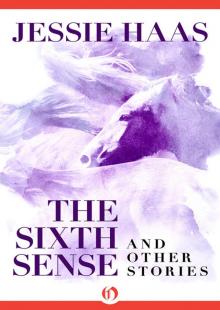 The Sixth Sense
The Sixth Sense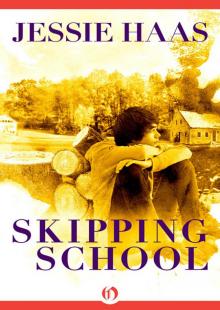 Skipping School
Skipping School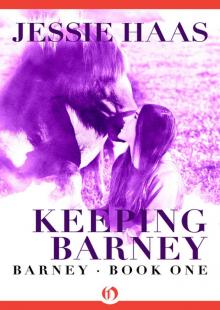 Keeping Barney
Keeping Barney Unbroken
Unbroken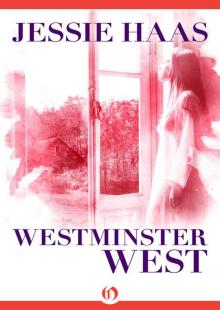 Westminster West
Westminster West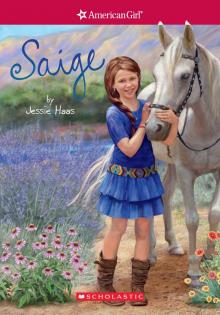 Saige
Saige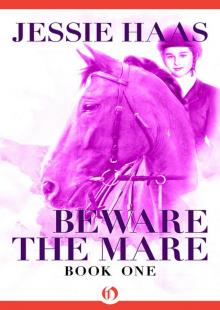 Beware the Mare
Beware the Mare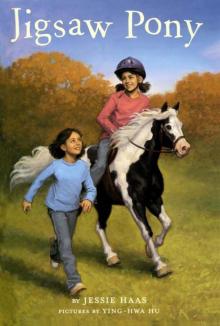 Jigsaw Pony
Jigsaw Pony Rescue
Rescue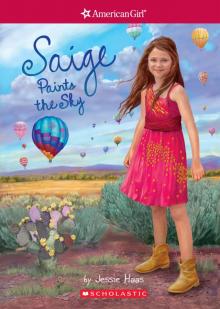 Saige Paints the Sky
Saige Paints the Sky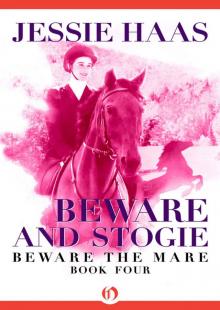 Beware and Stogie
Beware and Stogie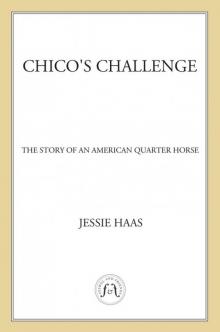 Chico's Challenge
Chico's Challenge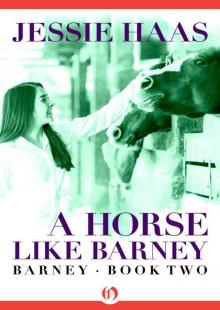 A Horse like Barney
A Horse like Barney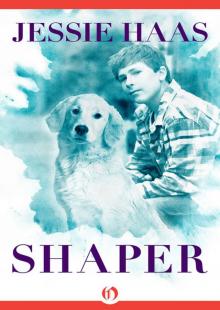 Shaper
Shaper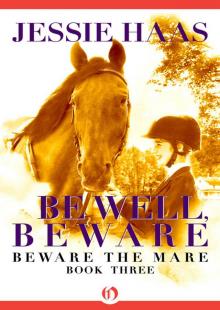 Be Well, Beware
Be Well, Beware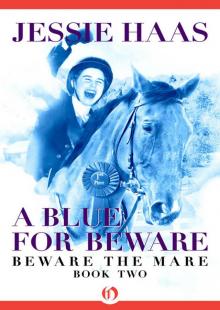 A Blue for Beware
A Blue for Beware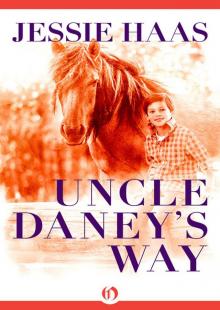 Uncle Daney's Way
Uncle Daney's Way